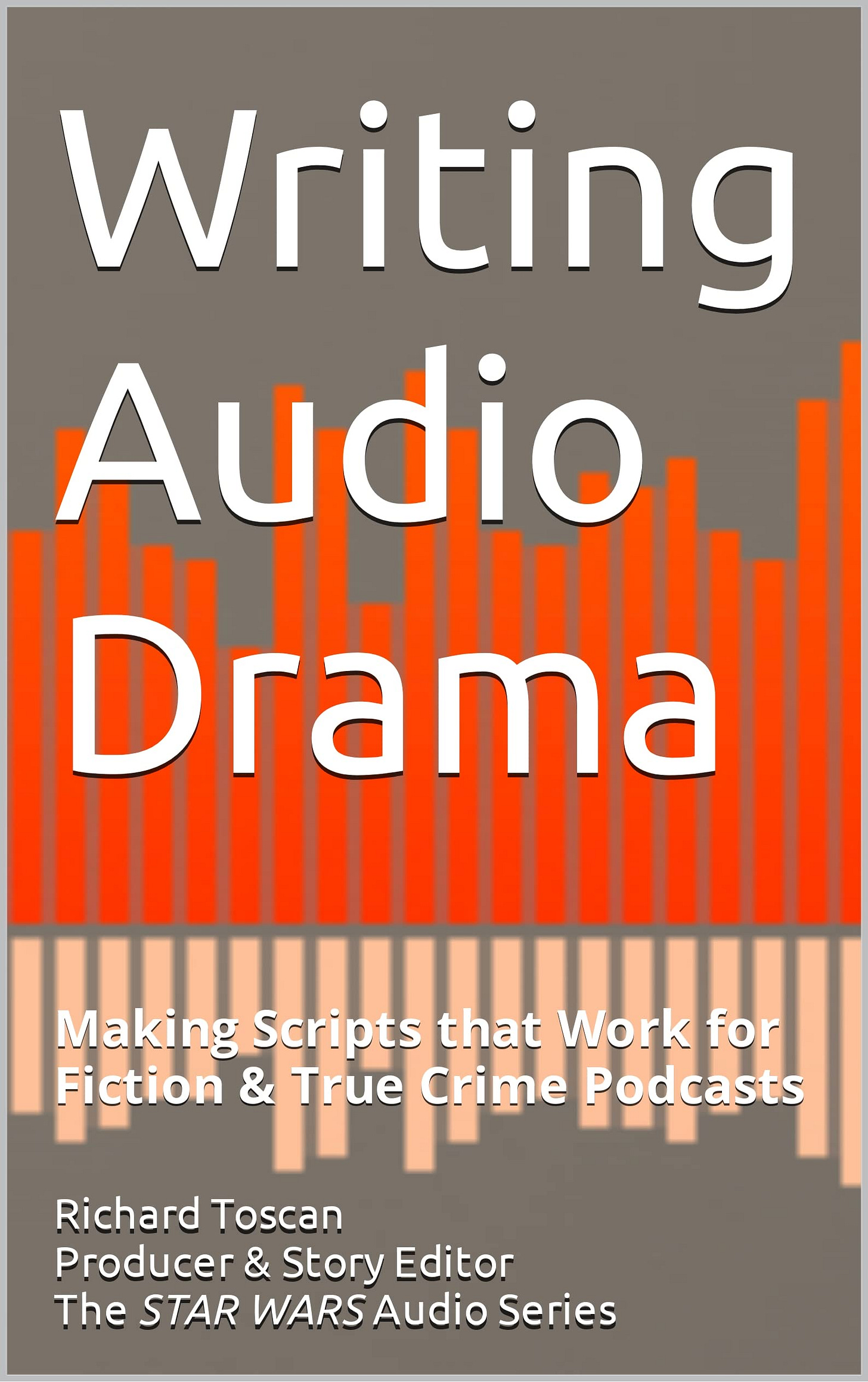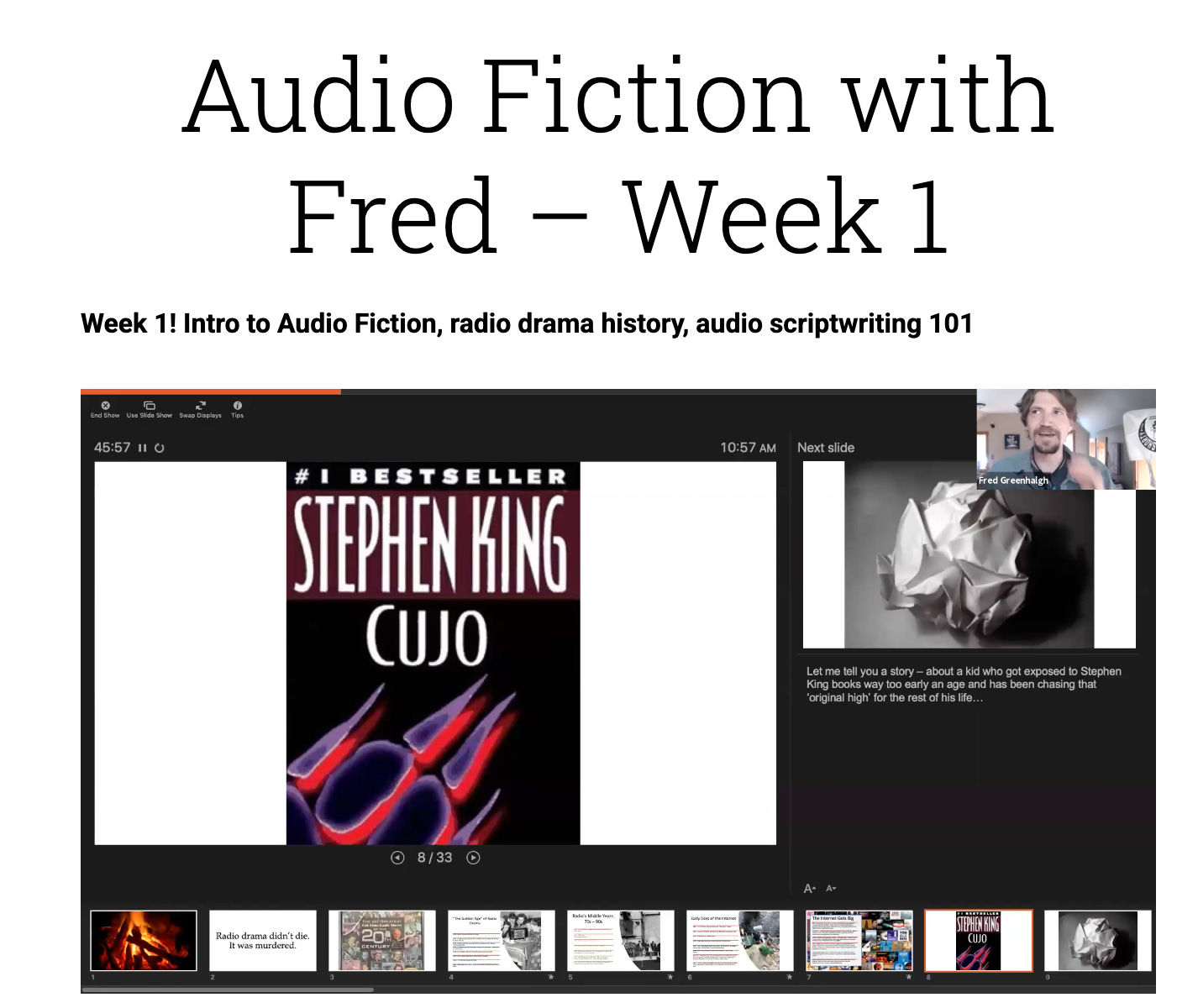(Not) Writing Audio Drama
Progress report on my plans to turn my books into podcasts and write some original audio dramas, and my attempts to find out how to do it right.
I know, I know, you've all been wondering, what's happened with all of the audio stuff that Matt's been talking about for months?
Okay, maybe it's not the very first thing on your mind. I mean, sure, the first thing on your mind when you wake up is probably, where's my coffee? or will my back ever stop aching? and then there's all that geopolitical and economic and climate stuff going on that you can’t help worrying about and... yeah, I get it. But still, it's nice to think that maybe some of you are a little bit interested in what I've been doing.
If you’re new here, this is what I was talking about.
Writing for radio
As a kid, I never used to enjoy audio dramas: they were old-fashioned entertainment that my mum and my great-aunt listened to. I was a modern boy, and I demanded television! I made an exception for The Goons, Round the Horne and a few other vintage radio comedies, but otherwise, radio was right out.
Well, to be honest, it's all gone a little George RR Martin.
I was hoping that by now I'd have some stories picked out and the first auditions done and maybe even the first recording, but it hasn't happened. Partly because I've had other things going on (which I'm not going to go into - nothing serious, just life in general) but I haven't had nearly as much time for writing as I'd hoped - or indeed, anything else. I started a vintage model of the Wright flyer before Christmas and was able to have it finished by New Year but it's still on my bench. (Among my many hobbies is building vintage model kits, sometimes older than me - this one’s from the 1950s. It horrifies collectors, who can’t understand why I would destroy the value by actually making them - but that’s half the fun of it.)

I'm not even halfway through my January reading list, and I've been unsuccessfully trying for the last three weekends to find time to watch both parts of Fritz Lang's Indian Tomb series. And I really wanted to find the time to make some big changes to Yellow Flowers and rewrite the first couple of chapters of that. And my daily walks and tai chi sessions have dropped down to most days. So it’s not just the audio stuff that’s gone to hell.
But it’s not just a matter of finding the time. It’s also partly deliberate. I've been trying to find out more about how to do audio properly before I actually start trying to do it.
At Christmas I got a book on writing audio drama and instead of focusing on writing, I decided to read my way through that. Unfortunately, it didn't help as much as I thought it would. Here's what I said about it on Goodreads.
This wasn't really what I was expecting. It should be called "how to write and sell mainstream commercial audio drama." Its primary focus is on a very narrow type of show (episodic, preferably multi-season, ideally mystery, true crime or sci-fi), aimed at maximizing downloads and fitting in with expected formats. Mostly, it's about "the formula": here's what people (listeners and producers) expect, and here's how you deliver it. If you write in any other style, you're doing it wrong.
Sadly, this emphasis on formula and dogma makes the book feel light on the creative and practical aspects. It was useful to understand things like how to use ambience to convey location, and how listeners can get confused if there are too many characters in a scene or if characters have similar names. But I wanted to learn more about how to write when there are no visuals and sound has to carry everything, how to pace a scene for audio, and do on. It was like going to a painting class expecting to learn how to paint landscapes and ending up at a lecture on how to be a successful graphic designer.
If you're looking to be a professional audio writer, and you already have a background in professional writing for stage or screen, you'll probably find this extremely useful. But I'm not, I don't, and I didn't.
So now I'm taking a five-part course on audio fiction with Fred Greenhalgh of Dagaz Media. He's one of the people who really inspired me to get into audio, along with John Scott Dryden, Sebastian Baczkiewicz and Julian Simpson. (And he’s a Mainer, which makes me happy.) He’s worked on projects with Stephen King (of course), and done adaptations of The X-Files and Locke and Key, and a magnificent folk horror anthology series, The Dark Tome.
It's a fascinating course, and I'm learning a lot of useful information about how to write and produce audio, but it's very dense and I'm having to take it veeeeerrrrry sloooooowly so that I can take it all in. Things like: how do you do scene transitions effectively when you can’t see what’s happening? What’s the audio equivalent of a close-up or a wide shot to convey intimacy or context? What are the pros and cons of sounds from a library compared to recording your own FX? Do you need footstep sounds when people are walking? How do you use music effectively to convey ambience and emotion? How do you cast and direct actors? How do you take all those audio files and turn them into something people will listen to. Basically, all the hands-on stuff that I hoped was going to be in the Toscan book. I’ll probably end up doing the source twice, or maybe more.
It’s all very practical too - Fred’s recommendation for the best script format is whatever works for you. His approach is that an audio script is not a thing in its own right: it’s a set of instructions, and as long as the person who’s reading it knows what you mean, it’s good. And since I’m going to be the writer, producer, director, sound designer, composer and most of the cast, then as long as it all makes sense to me, that’s all I need from it.
Realistically, it'll probably take me until middle or late February to get through it all, at which time I'll get back to audio. Hopefully. Unless something else happens. Which it probably will. Que sera, sera.
It's not at all how I hoped this winter would go, but that’s fine. Hopefully by the time I get around to doing this, I'll actually know what I'm doing instead of trying to figure everything out from first principles. And that’s got to be a good thing, right?







Matt I'm glad you're getting so much out of the course! Hopefully it's aged well, it's been 5 years and *so much* has changed (including me getting a full-time job doing this). And I recorded this in the very early in the pandemic, and my POV on recording with remote actors has evolved a lot... i.e. I think this was my first demonstration of a remote record ever? And now it's pretty much par for the course, the entire industry has moved away from in-person records on all kinds of projects for a variety of reasons (generally related to logistics and cost).
I mean to get around to updating that course some day, or maybe writing my own book, but for now just hit me up if you have any questions, I'm always happy to help.
With five more years of experience (and a few more awards and #1 shows under my belt) my POV remains that there is no one right way to do any of this... though there are some things I've tried and failed at, and tried and seem to have found somewhat successful, and your own mileage may vary!
One quick tip, conceiving a show that's designed to work for audio does make life a bit easier for you than trying to take a conceit that's inherently visual in nature and trying to 'audiofy' it. Case in point - my recent show NARCOSIS which deliberately set itself in the world of sea divers and using radio comms as a key storytelling method, so you have a natural way to have characters talk to each other that's not feeling like we're using all this dialogue to fill in for what should have been a camera establishing shot.
I love that you are putting those models together. I get that they allegedly are worth more to collectors in the box untouched, but where's the fun in that? If I designed a product intended for the purchaser to USE it and knew they were just wasting it by letting it sit on a shelf for years to collect dust in the box, I would be annoyed. The whole point of a model kit is to BUILD it. IMHO
I hope you are going to share some photos of your builds!